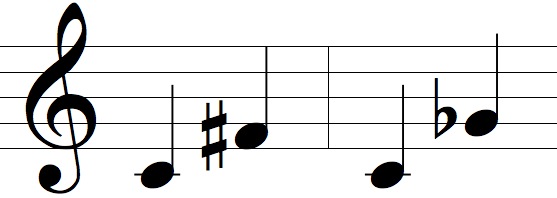Tritones – Writing
In the next set of lessons, you will see a Tritone lit up on your instrument and you will write it in music notation.
Usually, when you write a tritone, one of the notes will be an accidental, and the other will be natural.

Usually, when you write a tritone, one of the notes will be an accidental, and the other will be natural.

Tritones – Reading
Tritones
The next interval we will learn is called a Tritone.
A tritone is larger than a 4th, but smaller than a 5th.
Therefore, it can be thought of as a 4 that is sharp, or a 5 that is flat.

Theory Abbreviated
This lesson will provide the basics of chords and scales in an abbreviated format. If you would like to learn about these topics in greater detail, click HERE.
Intervals are the basic building blocks of music. The smallest interval is a half step which is the distance from one note to the nearest neighbor. The next larger interval is a whole step, which is equal to two half steps. The Major Scale is made of an alternating pattern of whole steps and half steps in the order Whole Whole Half, Whole Whole Whole Half.
Intervals are the basic building blocks of music. The smallest interval is a half step which is the distance from one note to the nearest neighbor. The next larger interval is a whole step, which is equal to two half steps. The Major Scale is made of an alternating pattern of whole steps and half steps in the order Whole Whole Half, Whole Whole Whole Half.
4ths and 5ths Dictation – Chord
In the next lesson you will hear either a Perfect 4th or a Perfect 5th played harmonically as a chord and you will write it in music notation.
Here are examples of both a Perfect 4th, and a Perfect 5th played harmonically.
Here are examples of both a Perfect 4th, and a Perfect 5th played harmonically.
4ths and 5ths Dictation – Down
In the next lesson you will hear either a Perfect 4th or a Perfect 5th played descending and you will write it in music notation.
Here are some examples of Perfect 4ths descending.
Here are some examples of Perfect 4ths descending.
4ths and 5ths Playing by Ear – Chord
In the next lesson you will hear either a Perfect 4th or a Perfect 5th played harmonically as a chord and you will play it on your instrument.
Here are examples of both a Perfect 4th, and a Perfect 5th.
Here are examples of both a Perfect 4th, and a Perfect 5th.
4ths and 5ths Playing by Ear Down
In the next lesson you will hear either a Perfect 4th or a Perfect 5th played downward and you will play it on your instrument.
Here are some examples of Perfect 4ths descending.
Here are some examples of Perfect 4ths descending.
4ths and 5ths Ear Training – Down
In the next lesson you will hear either a Perfect 4th or a Perfect 5th played descending and you will try to name it.
Here are some examples of Perfect 4ths descending.
Here are some examples of Perfect 4ths descending.
4ths and 5ths Playing by Ear Up
In the next lesson you will hear either a Perfect 4th or a Perfect 5th played ascending and you will play it on your instrument.
Here are some examples of Perfect 4ths ascending.
Here are some examples of Perfect 4ths ascending.